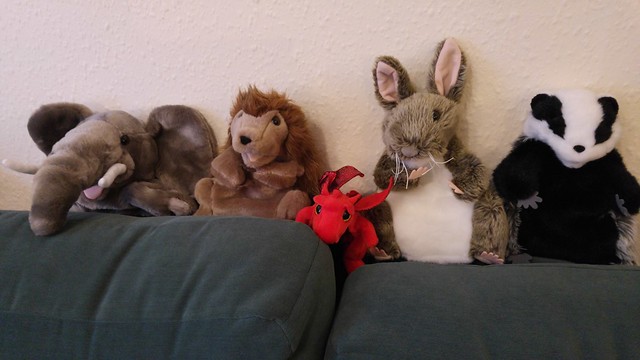Words for animal and related beasts in Celtic languages.
Words marked with a * are reconstructions.
| Proto-Celtic | *mīlom = animal |
|---|---|
| Old Irish (Goídelc) | míl = animal, louse, hare |
| Middle Irish (Gaoidhealg) | míl, miol [mʲiːl] = animal, louse |
| Irish (Gaeilge) | míol [mʲiːlˠ, mʲiːl] = animal, creature, insect, louse míolach = lousy, verminous, measly, mean, full of animals míolachán = verminous person or animal míoladóir = louse-picker, scrounger míoladóireacht = picking live, scrounging míoleolaí = zoologist míoleolaíocht = zoology míolra = vermin |
| Scottish Gaelic (Gàidhlig) | mial [miəl̪ˠ] = louse, tick, animal (archaic) mialach [miəl̪ˠəx] = lousy, abounding in live, harmless mialachd [miəl̪ˠəxg] = lousiness, harmlessness mialtag [miəl̪ˠdag] = gnat mial-bhalla = bedbug mial-eòlas = = zoology |
| Manx (Gaelg) | meeyl [miːl] = gnat, insect, louse, gnat meeyllagh = insectlike, lousy, verminous meeyllyn = vermin, flies meeyllaghys = lousiness |
| Proto-Brythonic | *mil [ˈmiːl] = animal |
| Middle Welsh (Kymraec) | mil = animal, beast, creature |
| Welsh (Cymraeg) | mil [miːl] = animal, beast, creature milaidd = pertaining to animals, like an animal, bestial mildraeth, mildraith = zoology, zoography, natural history mildraethydd = zoologist, zoographer milfa = menagerie milfeddyg = verterinary, surgeon, farrier milgi = greyhound enfil = animal, beast, creature |
| Middle Cornish (Cernewec) | mil = animal, beast milen = brutish, brutal, cruel milgy = hound, greyhound |
| Cornish (Kernewek) | mil = animal milonieth = zoology milus = brutal miluster = brutality milva = zoo milvedhek = vet, vetinary surgeon |
| Middle Breton | mil = animal |
| Breton (Brezhoneg) | mil [ˈmiːl] = animal euzhvil = monster morvil = whale |
Etymology: from the Proto-Indo-European *(s)meh₁l- (small animal) [source].
| Old Irish (Goídelc) | anmandae, anmande = animal, creature |
|---|---|
| Middle Irish (Gaoidhealg) | anmandae = living creature, animal, beast, head of cattle |
| Irish (Gaeilge) | ainmhí [anʲəvʲiː]= animal, brute, monster ainmhíoch = animal, brutish ainmhíocht = animal nature, brutishness |
| Scottish Gaelic (Gàidhlig) | ainmhidh [ɛnɛvɪ] = animal, beast of burden, heifer ainmhidheach [ɛnɛvɪjəx] = brutish, beastly ainmhidheachd [ɛnɛvɪjəxg] = brutality, brutishness |
Etymology: from the Old Irish ainim(m) (soul, life), from the Latin anima (soul, spirt, life; breath), or from the Proto-Celtic *anaman (soul, spirit), from Proto-Indo-European *h₂enh₁mos, from *h₂enh₁- (breathe), which is also the root of the English word animal [source].
| Middle Welsh (Kymraec) | aniueileit, anyueyl, anieuil = animal, beast, creature aniueileid, anifeilyeid, anifeiliaidd = animal-like, bestial |
|---|---|
| Welsh (Cymraeg) | anifail [aˈnɪvai̯l / aˈniːvai̯l] = animal, beast, creature anifeil(i)aidd = animal-like, bestial, brutish, savage, foul anifeilig = animal(-like), bestial, brutal anifeiliol = animal(-like), bestial, beastly, brutal anifeilrwydd = carnality, sensuality |
| Middle Cornish (Cernewec) | eneval = animal enevales = female animal |
| Cornish (Kernewek) | eneval = animal eneval dov = pet |
| Middle Breton (Brezonec) | aneual, anneual = animal |
| Breton (Brezhoneg) | aneval [ãˈneːval] = animal |
Etymology: from the Latin animal (animal, living creature), from animālis (animate, living), from anima (soul, spirt, life; breath) [source].
| Proto-Celtic | *betrixs = (?) |
|---|---|
| Old Irish (Goídelc) | bethadach = animal |
| Middle Irish (Gaoidhealg) | bethach, bethadach = animal, creature, beast |
| Irish (Gaeilge) | beithíoch [bʲɛˈhiəx / ˈbʲɛhiəx / ˈbʲɛhiə(h)] = beast, (large) animal, brute; (large) specimen of creature, bovine animal; heifer, cow, cattle, horse |
| Scottish Gaelic (Gàidhlig) | beathach [bɛhəx] = animal, beast, head of cattle, brute beathachachadh [bɛhəxəɣ] = living, feeding, nourishing, sustaining, nourishment, nutrition beathachail [bɛhəxal] = nutritious, nutritional beathachair [bɛhəxɛrʲ] = animator beathaich [bɛhɪç] = feed, nourish, support, sustain beithir [behɪrʲ] = any wild or savage thing, beast; thunderbolt; lightning; strong gust of wind; warrior, hero |
| Manx (Gaelg) | baagh = animal, pet, beast beishtagh = beastly, bestial, brutish, monstrous, filthy |
Etymology: from the Middle Irish betha (life), from Old Irish bethu (life), from Proto-Celtic *biwotūts (life), from *biwos (alive), from Proto-Indo-European *gʷih₃wós (alive) [source].
Words from the same roots include words for food and life in Celtic languages, quick and zoo in English, and vida (life) in Spanish [source].
| Proto-Celtic | *lutno- = (young) animal |
|---|---|
| Scottish Gaelic (Gàidhlig) | loth [l̪ˠɔh] = fily, foal, colt lothag [l̪ˠɔhag] = young colt / filly / foal lothaire [l̪ˠɔhɪrʲə] = gangly / spindly person lothach [l̪ˠɔhəx] = abounding in fillies / foals / colts |
| Manx (Gaelg) | lhiy = colt |
| Middle Welsh (Kymraec) | lluden, llydyn, llwdyn = (young) animal, beast llwdyngar = involving (carnal) bestiality |
| Welsh (Cymraeg) | llwdn = the young of an animal (colt, foal, kid, etc), animal, beast, young man, youth, oaf, dolt llwdngar = involving (carnal) bestiality |
| Middle Cornish (Cernewec) | lodn = young cow or sheep, young ox, bullock, steer, wether |
| Cornish (Kernewek) | lodn = bullock, young ox lodnek = bovine lodnow = cattle |
| Middle Breton (Brezonec) | loeznet, loezn, loznet = animal, beast loeznedus = abounding in animals |
| Breton (Brezhoneg) | loen [ˈlwẽːn] = animal, beast loeniñ = to brutalise, labour, punish loenedus = gamey loenegezh = bestiality loenek = animal, bestial, brutish |
Etymology: from PIE *polH- (animal young), from *peh₂w- (smallness). Words from the same roots include few, filly, foal, pony and puppy in English [source].
Sources: Wiktionary, Am Faclair Beag, Online Manx Dictionary, Teanglann.ie, eDIL – Electronic Dictionary of the Irish Language, In Dúil Bélrai English – Old Irish glossary, Geiriadur Prifysgol Cymru, Gerlyver Kernewek, Lexicon Cornu-britannicum: A Dictionary of the Ancient Celtic Language of Cornwall, Dictionaire Favereau, TermOfis, Le dictionnaire diachronique du breton, Etymological Dictionary Of Proto Celtic
